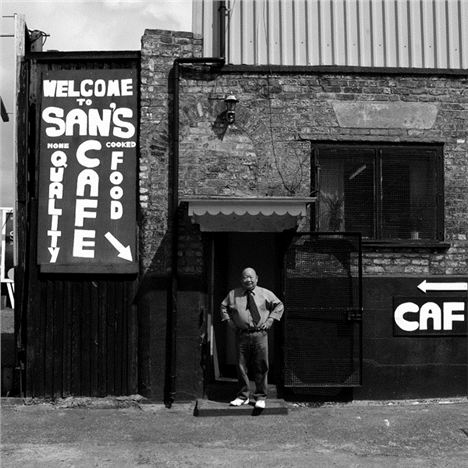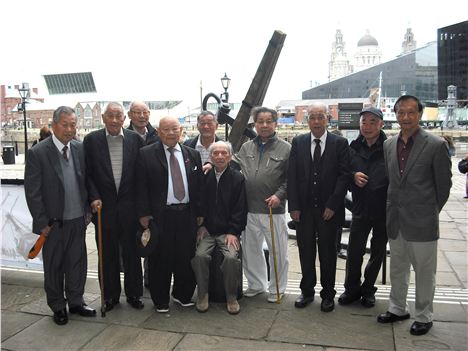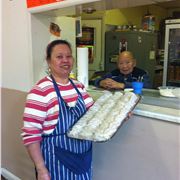TSENG Chikhao was either 89 or 90, or whatever, but would often laugh that as he never had a birth certificate, he was never quite sure how old he was.
The death of the Chinese café owner - to give him his proper title in modern day Chinese Zeng Zhi Gao - has meant the passing of another great city character.
'When I am in China I am treated like a VIP. But I am always glad to be back in Liverpool'
Born in the Chinese province of Sichuan he was known for over 60 years in Liverpool simply as "San".
He was always amused that none of his British friends could pronounce his Chinese name. San was the nearest they got….so it stuck. “It was very Liverpool and I was really chuffed,” he would say, in his thick scouse accent which was incongruous on first hearing.
And San’s Café was the name he gave to the small, family run greasy spoon-meets noodle bar, which he opened close to Liverpool’s docksides in Vauxhall and which for more than 40 years has been a popular and regular haunt for seafarers, lorry drivers, dock-workers, ships’ crews and officers, the local business community and others from across the city.
His story is full of escapades. Early in 1945, barely 20 years of age, he found himself in a war-battered Liverpool, a strangely exotic and wildly foreign city to his eyes. He spoke hardly any English apart from a few random words he had picked up in Calcutta. He had been transported in a troop ship – the Empress of Canada – from India to join the vitally needed pool of Chinese seamen in Liverpool who were to help revive Britain’s bruised merchant fleet that was running the wartime Atlantic gauntlet.
 San the man: San's cafe off Great Howard Street
San the man: San's cafe off Great Howard Street
Young Tseng was forced to leave China as a teeenager his family, from a rural village close to the Yangtze River, were scattered far and wide because of the Japanese War that had ravaged both the cities and the vast countryside since 1937, the cruelties now embalmed in the darkest pages of history.
After Pearl Harbour and the American intervention Tseng was drafted into the Chinese ‘nationalist’ army (as opposed to Mao Zedong’s Red Army) which was then under the control of Chiang Kai-shek. It was joining forces with the British and American armies in the struggle against Japan in Burma.
He was flown to Nepal and along with thousands of others was assigned to the Burmese front line in late 1941, spending 18 months in the heat of battle. He was wounded twice and, on the second occasion, after being discharged from a field hospital, discovered his regiment had moved on, constantly seeking out the enemy in the jungles.
Weak because of his wounds he couldn’t catch them up and was invalided out of the army. Returning to China was then out of the question and he was flown to Calcutta where he got a job as a waiter in a Chinese restaurant. There he spotted an advertisement for the British Merchant Navy. He applied, although didn’t hold out much hope, as he was quite small. But to his utter surprise he was accepted by the Blue Funnel Line.
He told me once: “I was so grateful to arrive in Liverpool. Back in my hometown we had often talked of this mysterious, faraway land of Britain, which we knew of in historical terms because of the Opium Wars of the 19th century, but I never imagined I would end up here."
For 20 years Tseng worked for Blue Funnel, traversing the globe but always returning to his beloved Britain where he had settled down and where his children were born.
After being made redundant in 1965, Tseng/San turned his hand to working part time in a Chinese restaurant in Manchester and later for several years as a ‘casual’ on the Liverpool and Birkenhead docks, part of a shore gang as he recalled.
He then opened the tiny café in Lightbody Street where he rustled up the fiery yet tasty food of his native Sichuan and other more homely British dishes such as bacon butties and egg and chips. It became almost a legend in his lifetime.
 San and some of the Chinese sailors who stayed in Liverpool after WWII.
San and some of the Chinese sailors who stayed in Liverpool after WWII.
San first went back to China to trace his relatives in 1958, before the now accepted insanity of the Cultural Revolution closed the country down again, and miraculously did find most of his sisters and brothers. But he didn’t return to the Middle Kingdom again until 1982 when the political situation had calmed and China was becoming ‘more open’ after the reform policies of Deng Xiaoping in 1978.
Since China opened up he was able to go back freely and made many new friends there. In an interview for the book ‘The Liverpool Friendship Arch’, that told the story of the famous Chinese Arch in Nelson Street, he said: “When I am in China I am treated like a VIP. But I am always glad to be back in Liverpool.”
 San and partner Linda in
San and partner Linda in
the café in December 2013
In later years he also worked as an advisor to several British companies doing business in China, notably the Liverpool Water Witch Company which makes marine pollution control vessels. And after 50 years as a member of the UK Chinese Freemasons, Tseng Chikhao was appointed deputy chairman. And when Liverpool twinned with Shanghai in 1999 he admitted he was delighted.
Perhaps one of his proudest claims, though, was that throughout his time living in the UK he never abandoned his Chinese citizenship or passport. To the very end he would show it to everyone he met. And ‘San’ would proudly declare: “Hey I am half Sichuanese and half Scouser.”
*Tseng Chikhao/San - died 5th March 2014, Liverpool. His funeral takes place tomorrow (Tuesday) at Springwood, 2pm.













